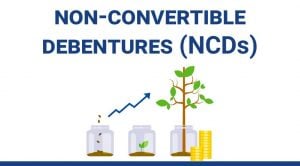NCD / Bonds – Definition, Types, Benefits, Investment Strategy & more
Last Updated Date: Nov 18, 2022Investment should be adopted as one of daily procedures of life. Such safeguarded money often shields us from uncertain circumstances. One such medium of investment is NCD, a Debt Instrument, which has features such as low risk and steady interest payment.
Capital market is no doubt a great medium of investment, but it is often stereotyped with risk, given the involvement of instruments such as equities. To start with these Bonds, they are oriented towards capital preservation and a payout of interest.
This is on the contrary to how stock market is generally perceived as, which is, high returns and increase in capital. Lot of us as investors, basically lack the knowledge of this part of stock market investment. So, this article adds-on to the list of investment options you must know about.

What are NCD / Bonds?
 Before you think of how fancy this investment option of stock market can get, let us draw a basic perspective on NCD. NCD Full Form, or in other words NCD meaning is “Non Convertible Debentures”.
Before you think of how fancy this investment option of stock market can get, let us draw a basic perspective on NCD. NCD Full Form, or in other words NCD meaning is “Non Convertible Debentures”.
To start with, these instruments have similar facets as that of Bonds. The part of this instrument we want our readers to know about is “unsecured factor”. This means, the company’s NCD bought can be lost in case of default made by the company. However, there is a lot investors can benefit from and they are briefed below.
NCD being the debt instrument is issued with the similar motive as that of an IPO done through equity medium, the need to raise capital. Corporate in need of loans, take funds from investors through respective agencies and promise to pay a regular interest to them.
Such NCDs cannot be converted into shares, and so pay a higher rate of return as compared to the counterpart – convertible debentures.
Open Demat Account Now! – Get 90% discount on Brokerage
Types of NCDs
If you wish to invest in NCDs, you need to know of the basic distinction, which separates the Secured NCDs from the Unsecured NCDs.
- Secured ones are safeguarded from the company’s assets, wherein, in case of default the investors will be entitled to payment on account of asset liquidation.
- At times of finical issues, the unsecured NCDs will not yield the investors the necessary returns.
Features of NCDs or Bonds
To provide a strong base to you investment decision making, here are the features of Bonds like instrument, Non-Convertible Debentures.
- Liquidity – An asset which is liquid shall be your prime consideration. So, when you are in need of fund, you will be able to convert them into cash readily to fulfill your need. Being listed on the exchanges, NCDs are high on liquidity. It is because buying and selling them is feasible through secondary market.
- Interest rates – You will be entitled to a higher payment of interest, if you build up a comparison between NCDs and FDs. High flexibility is a thing, which is the reason behind the options of monthly, annual and cumulative payout option. Unsecured ones are the highest interest bearers, and provide around 8 to 12%.
- Rating – You will have your hands on the ratings of the company. It is because the companies have to go past the barrier of credit rating agencies such as CRISIL, CARE, ICRA etc, and are rated among higher and lower accordingly. Any defaults of payment, will reflect in the rating, and can be identified by the investors to choose the best options.
- Risk – With the valid default and risk factor, the unsecured ones will yield no payments for the investors. It is always advisable to check out the history of company in terms of payments.
- Taxation – Sale within the period of a year would bear short term capital gains applicable as per tax slab. For longer period holding, long term capital gains at 20% with indexation shall be applied.
- Period – Flexibility is already mentioned, accordingly the time stretch can be 90 days to 10 years or even more. the choice lies upon the investors, solely.
NCD Investment Strategy or Bonds Investment Strategy
Since you have an idea of NCD Investment as of now, we also wish to render some strategies of Bonds Investment.
- You need to have a check on the ways your investment shall be used by the company. They have to account for it, and if you do not find the same, it would be a bad idea to invest with them.
- Do not stick to a company with long interval investment. You must diversify, aiming for different companies and also distinct time intervals.
- Do not perform one sector investment, such as that of NBFs, which aim to provide higher personal loans. This will increase your risk multifolds.
- Secondary market listed companies have a history of repayments. So, you may choose to invest in the new ones they provide, being a part of the market for long.
- Check out the NCD yields (the actual return), along with the interest rates. Not solely the interest rates.
- Make it a point to sell your instrument, when the interest is accounted for and due. You can expect greater returns this time, as it is the prime trading time.
How to choose the right NCD / Bonds for Investment?
Here are some of the items which an investor should note down, before sticking up to NCD Investment or Bonds Investment of a particular company.
- Credit rating
- Debts obligations of the company
- Capital Adequacy Ratio (CAR)
- Interest coverage ratio
- Investors Tax slab
- Provisions for non performing assets.
How to Invest in NCDs or Bonds?
There are certain requirements you need to fulfill, if you wish to Invest in NCDs or Invest in Bonds.
- You must have a demat account, which would be you electronic share storage medium. Choose your favorite stock broker in this context.
- you may further buy NCDs from the companies issuing them directly, or from the distributors, i.e. the stock brokers.
Note: Identify your goals, and time duration. Following which, you must perform a detailed analysis on the company’s background before investing. Also, figure out the objective of the company in issuing NCD.
NCD / Bonds – Conclusion
We managed to draw up the case scenario through this article. While NCD Bonds are your go to investment options, you need to be cautions. It is just like the times when you decide investing in other options.
These debt instruments are highly appreciated medium of investment, and they sure would provide a significant return on investment. But, this shall be done after a detailed understanding of its nature and factors. Ensure you look after all such criteria’s before investing.
Non Convertible Debentures FAQs
Ques – What are non convertible debentures or NCD?
Answer – NCD is apparently a debt instrument which is issued with the similar intention as that of an IPO done through an equity medium, and that is, the need to raise capital. The corporate that are in dire need of loans, take funds from investors through specific agencies and promised to pay a concurrent interest to them.
Ques – What are the different types of NCDs?
Answer – There are two specific types of NCD: the secured NCDs and the unsecured NCDs.The secured ones are totally safeguarded from the companies assets. On the other hand, the unsecured NCD will not yield any returns to the investors.
Ques – What are the features of NCDs or Bonds?
Answer – The six prominent features of NCDs or bonds are:
- Liquidity
- Interest Rates
- Rating
- Risk
- Taxation
- Period
Ques – Is it profitable to invest in NCDs or Bonds?
Answer – These debt instruments are immensely valued medium of investment and provide an exceedingly hefty return on investment. Having said that, it is definitely profitable to invest in NCDs or bonds.
Ques – Is investing in NCD better than fixed deposit?
Answer – NCD as a debt instrument has extremely less risk and a steady interest payment. Such an option to safeguard money often protects customers from unwarranted circumstances. On the contrary, a lot of investors lack the knowledge of this arena as far as stock market investment is concerned. Our article provides a thorough compilation on how investing in NCD is better than fixed deposit any day.
Ques – What are the different NCD investment strategies?
- Check the way your investment is being used by the company.
- Never stick to a company that has a long interval investment.
- Never perform NBFs that proclaim on providing higher personal loans because this will increase your risk.
- Do a thorough check on all the NCDs as well as the interest rates.
- Make sure you sell your instrument when the interest is due. This way, you can expect huge
Ques – How to choose the right NCDs or Bonds?
Answer – Some of the factors that might be kept in mind before choosing the right NCD or a bond, are:
- Credit Rating
- Investors tax slab
- Capital Adequacy Ratio
- Provisions for non performing assets
- Debts obligations of the company
Ques – How to invest in NCDs or Bonds?
Answer – The first thing you need to do is have a demat account, in correlation with your favourite stockbroker. You may now buy NCDs from the company by issuing them directly or from the distributors, whatever rocks your boat. Make sure you identify your ambition and time duration after which you must perform a detailed evaluation on the background of the particular company before you invest your money over here. Not to forget, make sure you figure out the objective of the company while issuing NCD.
Ques – What are the features of NCDs or Bonds?
Answer – Some of the features of bonds or NCDs are:
- Issue
- Credit Rating
- Interest Rate
- Return on investment
Ques – Who are eligible for investing in NCDs or Bonds?
Answer – Absolutely anyone can invest in NCDs. Nevertheless, investment into that is not recommended due to a lot of risk associated with it. The biggest risk is that of credit risk. Here, investors must not be enticed by the high interest rates that the NCDs or bonds offer and they should keep in mind all the risks associated with it. .
Open Demat Account Now! – Get 90% discount on Brokerage
Most Read Articles
